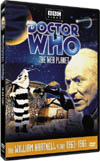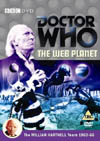DVD Extras include:
Episode One GaffesOnce more, camera angles begin to needlessly miss the mark. Vicki makes her entrance and delivers her first lines off-screen, only because the cameraman is told to aim for a four-shot and can't move back far enough to get all the TARDIS crew-members in the frame. William Hartnell delivers the worst flub of his entire Doctor Who career, as he completely forgets his lines, and can't even invent a few new ones on-the-fly as usual. William Russell is no help at all during this moment, his blank, inquisitive persistence adding more pressure and dead air-time to the proceedings. Painful to watch.The TARDIS is used as an exploration tool in this story, and not just a means to drop the characters into the setting. Nicely plotted. More stories should use the TARDIS this way. The deep interior returns, and the astral map is a nice new addition. On the minus side, the inlay effect used to make the TARDIS fade partially away and come back is extremely poorly aligned, calling attention to the way the effect was mis-handled. It's not easy to throw an actor's lips and voice out of synch on this program, seeing as how it was taped practically live, yet Richard Martin manages to capture such a moment for episode one's cliffhanger. Luckily this is fixed for the opening of episode two, but it's a little late.
A Shift for Episodes Two Through SixThe technical faults of the story's production become less glaring (although still present) for the remaining five episodes, as the source of greatest naff-ness shifts onto the guest Menoptera characters. Despite excellent costume design and an incredible set, our director would again have us believe that alienness and high-pitch voices with unnatural emotional delivery go hand in hand. Once again, technically-dodgy spectacle undermines character and drama instead of enhancing it.All scenes on the exterior of the planet Vortis are shot with grease or filters on the lens. This helps to cover up imperfections in the sets and costumes in an interesting way (okay, that's good), but it also covers up many of the subtleties of expression on the main characters' faces and makes one want to adjust one's set to get a clearer picture (okay, that's bad). More discrimination should be used in applying this effect, particularly its position in the frame. The music tracks imported for use in this story are fairly good - they're "out-there" in terms of style, yet also create a good moody quality for the story. Jacqueline Hill (Barbara) gets a holiday during episode three, and this is an interesting way of dealing with a companion's absence. Nothing happens to her character during this episode, so we are simply spared any plot-dead scenes. Not bad. Action rightly focuses on the remaining three regular characters. The plot simply keeps attention fixed where things are at their most interesting. Further depths of silliness are reached, literally, during an underground subplot later in the story, where we meet a sub-race of "Optera" whose performances are a put down even to children. While this coughs up a bit of cultural exploration from a story point of view (and by God, what a cheesy culture it is!), it does absolutely zero for the plot and simply wastes the time of all the characters involved in it. Despite her one episode absence, Barbara begins to get the best that this story has to offer, including being involved in one of the most ambitious sequences ever shot for Doctor Who, near the end of episode four, which actually turned out to be quite beautiful and charming, and added a good impact to the story.
Where is Hilio?Martin Jarvis has proven himself to be an exceptional actor, so it is interesting to see what he does before his career really took off with the heavily costumed role of Hilio, a Menoptera Captain, despite the questionable directing of both Richard Martin for voice quality and Roselyn de Winter for "insect movement". In fact, he does appear to be the one Menoptera who still manages, through the above-mentioned restrictions of portrayal, to convey a sense of both charisma and guts, not to mention a clear-headed focus on his duty. Richard Martin apparently has no idea that he has a rising star on his hands, and does Jarvis's Hilio the greatest injustice in rendering his character unnoticeable. There are practically no close-ups of Jarvis, particularly in his more emotional scenes. In fact, he's lucky enough to be included in long-shots and group shots, and he has to deliver many of his best lines either off-screen or with his back to the camera. Way to go, Richard. If I hadn't specifically been looking for this performance, I wouldn't have noticed it myself. In fact, extremely little seems to have been done to make any of the alien characters stand out as individuals among members of their own species. Judging by the visuals that appear in the end product, it's almost impossible to tell whether the make-up artists made an attempt to differentiate them or not. Perhaps the restored version on the DVD can shed new light on this...
Anticipation builds.... to a Failure to DeliverThe full dissection of the story's conclusion contains too many spoilers to be included here. Check out the In-depth Analysis version of this review to get the full details. Suffice it to say that episode five sets up a really great ending, the kind of Doctor Who conclusion that we've all been long-awaiting after so many other early stories have let us down. As I say, a well-structured plot.What actually happens in the final episode and the cliffhanger leading up to it is rather disappointing. The obvious great ending seems to have been thrown away in favour of more silliness and story padding. The concluding action is just simply a poorly motivated mess, in which none of the characters display any charisma at all, and the set simply looks cheap and cheesy, even before it falls apart. This is a real cop-out of an ending, particularly in the writing, and doubly-bizarre because such an excellent ending was set-up in the previous episode. Someone really went out of their way to mess this up. In an interview in issues 232 and 233 of Doctor Who Magazine, Richard Martin admits to making a few amendments to what he considered (probably quite rightly) to be a poor script. His amendments do not seem to be much improvement, as he proceeds to take credit for the entire underground "Optera" sub-plot. I wouldn't be surprised if he adjusted the final episode for less dramatic dialogue (William Hartnell's strength) and more "action" (which became very silly). To top it off, the heroic character in the story who deserves the most credit is practically ignored, while those who did little or nothing take all the credit. Thus the show and its characters are further undermined. The fight within the BBC for Doctor Who to be taken seriously as a drama, as opposed to a children's show, is well documented. With that in mind, note that Richard Martin had this to say in his Doctor Who Magazine interview: "We were just doing a fairly crappy children's series which actually had a bit of popularity." Children's show mentality certainly seems to reign in these six episodes at least, and they are the worse off for it. Today's concept deserved a far more serious execution.
This story has become available on DVD and VHS video. Click on the Amazon symbol for the location nearest you for pricing and availability:
Comments on this article are welcome. You may contact the author from this page:
|








